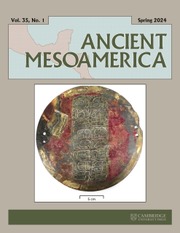-
- Get access
- Contains open access
- ISSN: 0956-5361 (Print), 1469-1787 (Online)
- Editors: Blanca Maldonado Center for Archaeological Studies|El Colegio de Michoacán|Sede La Piedad|Mexico, Sarah B. Barber University of Central Florida, USA, and Christina T. Halperin Département d'anthropologie|Pavillon Lionel-Groulx|Université de Montréal|Canada
- Editorial board
Introducing the first Compact Section: Ancient Maya Inequality
In the first of Ancient Mesoamerica's Compact Sections, multiple Mayanists worked together to compare residential inequality using the exact same methodology for dozens of cities...
"The Compact Section format focuses on building strong, comparative analyses through an introductory article and several case studies. The introduction provides the research methodology and background for the entire special issue with cross-citations to the case studies, and then each case-study focuses on a specific aspect and research question related to that method without needing to repeat that text from the introduction. This format facilitates collaborative research with more freedom for authors to focus on their specific interests. As exemplified by this research effort, this new format makes a great venue for regional comparisons and collaborative research."
Read the new blog from Adrian S.Z. Chase in full here.


Facebook